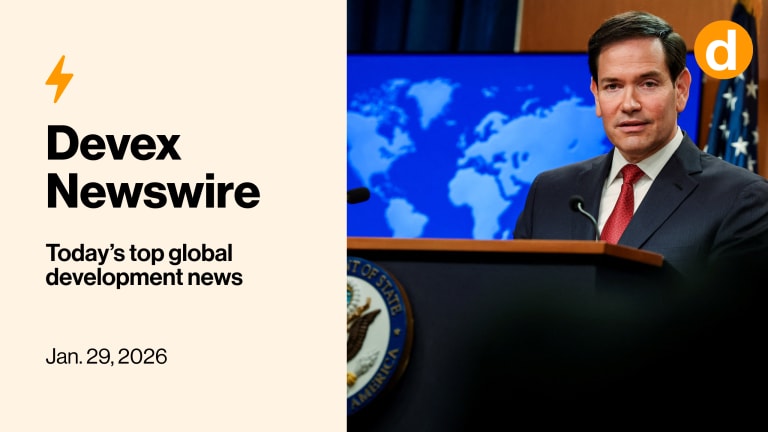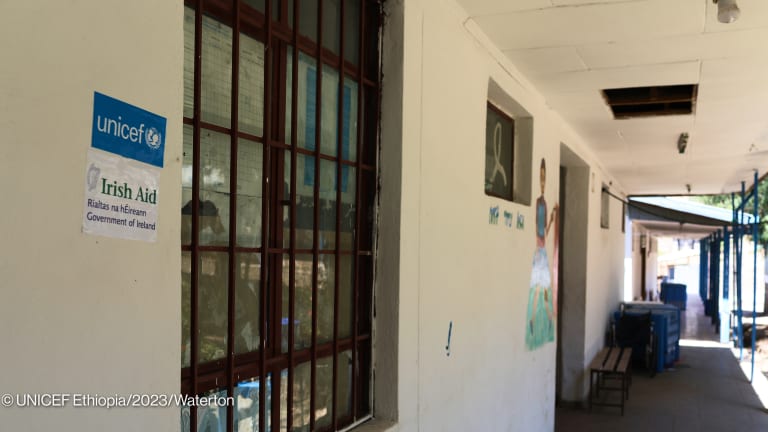
Treasurer Joe Hockey’s much-awaited announcement of Australia’s 2014-15 federal budget on Tuesday came down as a firecracker for the country’s aid community — and the breakdown of official development assistance allocations confirmed the worst fears of many development implementers dependent on these funds to continue their programs.
When the cabinet official took to the stage and detailed further cuts to the foreign aid portfolio, many development professionals recalled Prime Minister Tony Abbott’s pre-election commitment to increase ODA spending to 0.5 percent of GNI, albeit without giving a clear timeframe.
But since Abbott assumed power in September 2013, local aid groups complain the 0.5 percent has turned into a “broken promise,” not just to Australians themselves, but also to the scores of poor people who benefit from the country’s aid program and (used to) see the country as a world leader in this aspect.
As if the AU$4.5 billion aid cuts announced in September when he took office is not enough, Abbott is now engineering a move to further reduce the aid portfolio managed by the Department of Foreign Affairs and Trade with an additional $3.1 billion reduction over the next two years. Even the scrutinized plan to increase foreign aid adjusted by the consumer price index has been delayed to 2016, on top of Foreign Minister Julie Bishop’s scheme to put a cap on the already trimmed-down budget.
For Australian NGOs and humanitarian groups, the decision can be described in many ways. Some call it abandonment. Others call it disgrace and disappointment, while the rest just call it a lack of honor (in keeping promises) and commitment.
Oxfam chief Helen Szoke noted in a statement that the Abbott government has “broken its better-than-nothing promise to marginally increase Australia’s aid budget … [and that this is] yet another blow to the millions in our region living on less than $2 a day — most of whom are women.”
This, though, seems to be a “non-issue” for the current administration, sticking to its position that Australia must be prudent, efficient and effective in all of its spending to have more bang for every Australian’s buck and to focus more on domestic development first. Robert Yallop from CARE Australia disagrees.
“Aid is one of the most effective investments Australia can make in the security and prosperity of the region,” Yallop said in a statement sent to Devex. “It fosters economic growth and stability, above all, results in fewer children dying from malnutrition and fewer mothers dying during pregnancy and childbirth.”
Details
Australia’s overall ODA budget is projected to stand at $5.032 billion, and DFAT says that works in “Australia’s national interest through contributing to economic growth and poverty reduction.”
Looking at the regional and country allocations of ODA, the biggest losers are Latin America and the Caribbean with allocations zeroed out from $15.1 million, as well as Africa and the Middle East with a 29 percent reduction to $143 million from $202.3 million the previous year.
These reductions, according to DevPolicy director Stephen Howes, may be meant to shelter the Pacific from the cuts, whose allocations have increased by over 9 percent to $966.6 million from $882.2 million the previous year.
“The Pacific and Papua New Guinea are being shielded from those cuts … by a refocusing of the aid program on the region,” Howes told Radio New Zealand.
Other priority allocations include a $338.6 million funding for humanitarian,emergencies and refugee expenditure, a $120 million emergency fund and a $134 million fund for NGOs under the Australia-NGO Cooperation Program, to name a few.
The $7.6 billion overall cuts in the country’s aid budget, Shadow Minister for Foreign Affairs and International Development MP Tanya Plibersek pointed out, don’t paint the whole picture, as the recent cuts were “on top of a further $8.4 billion Mr. Abbott has cut from overseas aid by walking away from [the] funding he promised as late as December last year.”
Plibersek added this huge amount of money “puts many excellent overseas aid programs at serious risk” and that it can “make a world of difference to some of the poorest countries” if reinstated. The potential gains from the amount include:
● Teaching 53 million people to read and write.
● Providing 3.2 billion life-saving malaria treatments.
● Delivering antiretroviral treatment for 20 million HIV-positive people.
● Training 6.4 million new midwives in developing countries.
Facing consequences
Turning away from all of these commitments would be turning away from what made Australia a frontline player in the region’s development, noted ActionAid Australia’s Archie Law.
“This government is focused on contributions that Australians can make to the nation, yet they have abandoned Australia’s contribution to the world’s poor,” Law said in a statement. “These commitments have been swept off the table and swept under the rug.”
Even smaller advocacy groups like the Micah Challenge, a faith-based anti-poverty organization, chimed in, saying that helping other people over helping fellow Australians should never be a toss coin between the two. Micah Challenge’s political engagement coordinator Ben Thurley said that the notion that a “wealthy nation like Australia, with one of the lowest government debt levels in the world, needs to choose between the world’s poorest people and Australia’s future needs” should be rejected.
This is on top of the impending consequences for Australian government employees, particularly staff from the now-defunct AusAID. DFAT announced following the budget release that it plans to reduce staff number by about 500 for “operational efficiencies.”
Are you affected by these budget cuts? Do you know any AusAID-DFAT employee in danger of being laid off? What do you think about this staff reduction? Please let us know by leaving a comment below, joining our LinkedIn discussion or — if you wish to remain anonymous — sending an email to news@devex.com.
Read more development aid news online, and subscribe to The Development Newswire to receive top international development headlines from the world’s leading donors, news sources and opinion leaders — emailed to you FREE every business day.
See more:
The foreign aid program that Australia 'can afford' — DFAT
Disappointed NGOs slam Australia's aid cut details
Aid cuts make Australia 'a less generous nation'








